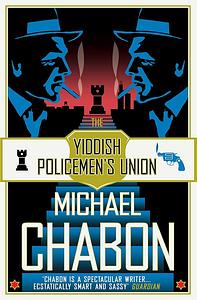Take a photo of a barcode or cover
adventurous
mysterious
reflective
medium-paced
Plot or Character Driven:
A mix
Strong character development:
Yes
Loveable characters:
Complicated
Diverse cast of characters:
Yes
Flaws of characters a main focus:
Yes
Michael Chabon’s The Yiddish Policemen’s Union presents a masterfully crafted alternate history steeped in the grim, cynical atmosphere of a hard-boiled detective novel. The story follows Detective Meyer Landsman as he navigates a richly imagined Jewish enclave in Sitka Alaska a speculative refuge for Jews established after the collapse of the fledgling state of Israel. Through meticulous worldbuilding, Chabon creates a narrative where every offhand comment and seemingly minor interaction contributes to the textured realism of this fictional society.
The novel integrates classic noir tropes, from the disillusioned detective to the pervasive sense of moral ambiguity, but with a distinctive Yiddish twist. The cultural flavoring isn’t just decoration. The integration of Jewish tradition and identity adds a meaningful layer that resonated with me personally. As someone connected to Jewish heritage, I found the portrayal of this world engaging and somewhat alien. It offered a rare but meaningful reflection of cultural survival and adaptation.
Chabon’s descriptive prose is another standout feature, vividly bringing characters and settings to life. His ability to craft a particular mood at once somber and darkly humorous perfectly complements the themes of loss, resilience, and existential inquiry that run through the novel. The writing is layered with wit and poignancy, offering a narrative that is simultaneously entertaining and introspective. (A highlight being the cultlike compound where every single item has a plaque stating which American Jew donated it)
Two quotes particularly capture the tone and thematic depth:
“Each morning the pious Jew twines one of these doodads along his left arm, ties another to his forehead, and prays for understanding of the kind of God Who obliges somebody to do something like that every damn day of his life.”
And
“In the dreamy seconds that precede his loss of consciousness, the guttural language that Landsman heard Roboy speaking plays like a recording in his ear, and he makes a dazzling leap into impossible understanding, like the sudden consciousness in a dream of one having invented a great theory or written a fine poem that in the morning turns out to be gobbledygook.”
I can only hope that one day Chabon returns to this world for a sequel.
I gave this book my best shot. I wanted to like it. I expected to like it. I consider myself an educated person who won't baulk at a book because it has a smattering of foreign words mixed in. However, this book proved me wrong. I just couldn't get past the massive amounts of Yiddish scattered throughout the storyline to see the actual story. I tried. I really did.
Aside from the Yiddish, it's just a really depressing book. Life is short and I've only got another 50 years of reading left (if I'm lucky.) I can't afford to waste my time force feeding myself a book that I dislike so much.
Aside from the Yiddish, it's just a really depressing book. Life is short and I've only got another 50 years of reading left (if I'm lucky.) I can't afford to waste my time force feeding myself a book that I dislike so much.
My one complaint with the book is that Hertz's last name wasn't Donut so that whenever he said his name people will be like. "No it doesn't hurt"
I thoroughly enjoyed every moment of reading this book. The writing is superb and a treat to read. I liked the characters more than most. The who-done-it plot might not have been completely gripping but it moved the story along at a nice pace. It takes a lot for me to loyally follow contemporary authors but I'm looking forward to getting my hands on another Chabon novel. Fun and worthwhile read. Ps-I just learned this has been purchased by the Cohen brothers...not sure how I feel about that. Better suited for Wes Andersen in my mind. We shall see!
Originally posted at ragdollreads.co.uk
“Maybe I missed something somewhere…” ~Me, post-book
TL;DR – I liked this book enough to finish it, but not enough to read it again. Recommended for crime fans.
RAGDOLL RATING: 3.5/5 BUTTONS
Why I read it…
It won the Hugo for Best Novel -2008 (Reading challenge category)
I wouldn’t say I’m ‘big’ into crime novels – I enjoy them, but it’s not my usual area. Having said that, I’m a sucker for alternate history, so I thought I’d give it a shot.
The Story…
Alternate History – The state of Israel collapsed in 1948, and for the Jewish people in diaspora moved to (and thrived in) a temporary new homeland – The Federal District of Sitka, Alaska. The district is due to revert to Alaskan control.
Alcoholic cop, Meyer Landsman is woken one morning in his flea-bag hotel room and informed of a murder in another room. Together with his partner Berko Shemets, Landsman sets about solving the case – and gets much more than he bargained for!
What I liked…
My first impression was the setting. As I say, I’m a sucker for alternate history, so this gave me something to sink my teeth into right from the start. It was, admittedly, quite a culture shock, what with me knowing very little about Jewish cultures, and even less about Yiddish terminology, but once I got my head around the basics everything settled nicely.
Secondly, the plot. It’s difficult to say what I particularly liked about it without giving away more than I am comfortable about the story itself. I enjoyed how the story progressed – it was entertaining, and kept the air of mystery about it as the case slowly unfolded – needless to say I absolutely did not guess ‘who dunnit’.
What I disliked…
The ending. I’m not going to say what happens and ruin it for anyone. I’ll also say right now that the ending wasn’t necessarily bad. As I said in my quote at the top, I feel like I must have missed something because I was left feeling like the story had just lost steam by the end.
The case was progressing, and I was enjoying it. Things were escalating and it was exciting. Discoveries were being made and everything looked great. Then it just sort of ended. This is why I think I missed something. As far as the plot goes, it makes sense to have ended where it did – I guess I just expected it to go another way. I could read the last few chapters again – and indeed I might – but for the moment, the vague sense of disappointment.
Another minor thing – the case had a chess theme, and often there were descriptions of chess moves, or terminology that admittedly flew right over my head. This isn’t a criticism of the writing itself – I’m quite sure if you’re slightly more familiar with chess than I am those parts would make perfect sense – it was just something that made little bits harder to follow.
Final thoughts…
When I started reading, I was having fun – and I really wanted to enjoy this book more than I did. Frankly, if it wasn’t for the ending – which I remind you, wasn’t necessarily bad, it just wasn’t what I was expecting – then this would have got a solid four buttons. Unfortunately, the fact the I got to the end with my interest waning knocked off some points.
One final point. When I started writing this review, I gave the book a 3 button rating. However, as I was writing, bits of the book I had enjoyed kept coming back to me and the rating seemed unfit – it didn’t do it justice. This book isn’t a bad book – I would recommend it to a crime fan – it just didn’t hit the right buttons for me!
“Maybe I missed something somewhere…” ~Me, post-book
TL;DR – I liked this book enough to finish it, but not enough to read it again. Recommended for crime fans.
RAGDOLL RATING: 3.5/5 BUTTONS
Why I read it…
It won the Hugo for Best Novel -2008 (Reading challenge category)
I wouldn’t say I’m ‘big’ into crime novels – I enjoy them, but it’s not my usual area. Having said that, I’m a sucker for alternate history, so I thought I’d give it a shot.
The Story…
Alternate History – The state of Israel collapsed in 1948, and for the Jewish people in diaspora moved to (and thrived in) a temporary new homeland – The Federal District of Sitka, Alaska. The district is due to revert to Alaskan control.
Alcoholic cop, Meyer Landsman is woken one morning in his flea-bag hotel room and informed of a murder in another room. Together with his partner Berko Shemets, Landsman sets about solving the case – and gets much more than he bargained for!
What I liked…
My first impression was the setting. As I say, I’m a sucker for alternate history, so this gave me something to sink my teeth into right from the start. It was, admittedly, quite a culture shock, what with me knowing very little about Jewish cultures, and even less about Yiddish terminology, but once I got my head around the basics everything settled nicely.
Secondly, the plot. It’s difficult to say what I particularly liked about it without giving away more than I am comfortable about the story itself. I enjoyed how the story progressed – it was entertaining, and kept the air of mystery about it as the case slowly unfolded – needless to say I absolutely did not guess ‘who dunnit’.
What I disliked…
The ending. I’m not going to say what happens and ruin it for anyone. I’ll also say right now that the ending wasn’t necessarily bad. As I said in my quote at the top, I feel like I must have missed something because I was left feeling like the story had just lost steam by the end.
The case was progressing, and I was enjoying it. Things were escalating and it was exciting. Discoveries were being made and everything looked great. Then it just sort of ended. This is why I think I missed something. As far as the plot goes, it makes sense to have ended where it did – I guess I just expected it to go another way. I could read the last few chapters again – and indeed I might – but for the moment, the vague sense of disappointment.
Another minor thing – the case had a chess theme, and often there were descriptions of chess moves, or terminology that admittedly flew right over my head. This isn’t a criticism of the writing itself – I’m quite sure if you’re slightly more familiar with chess than I am those parts would make perfect sense – it was just something that made little bits harder to follow.
Final thoughts…
When I started reading, I was having fun – and I really wanted to enjoy this book more than I did. Frankly, if it wasn’t for the ending – which I remind you, wasn’t necessarily bad, it just wasn’t what I was expecting – then this would have got a solid four buttons. Unfortunately, the fact the I got to the end with my interest waning knocked off some points.
One final point. When I started writing this review, I gave the book a 3 button rating. However, as I was writing, bits of the book I had enjoyed kept coming back to me and the rating seemed unfit – it didn’t do it justice. This book isn’t a bad book – I would recommend it to a crime fan – it just didn’t hit the right buttons for me!
I'm not sure how this book ended up on my TBR pile but I'm so glad it did. I enjoyed the twists and turns of the story. The characters are well written and complex. This is such a good book!
I read this without really knowing what I was getting into, I was expecting "standard" Michael Chabon. This book was a whirlwind of an alternate history with some fantasy/sci-fi/religious elements sprinkled in. It was fascinated by the idea of a large Jewish community in rural Alaska. As always, he combined wit and an effusive writing style to make a memorable novel. I'd recommend this for anyone who is into historical fiction (emphasis on the fiction) or anyone who likes contemporary fiction.
Great plot, great characters, complex alternate reality and history. Good reader on audiobook as well. Awesome.
Michael Chabon is one of the most talented writers around today. This one wasn't quite as good as Kavalier and Clay, but still thoroughly enjoyable.
I love books that are circles, books where the shadows of history come to the forefront, books that are bittersweet. This book meanders in the middle, but its beginning and end tie together extremely well. I am sure that I'll reread this again -- I plan to buy my own copy. It all comes back to that dog, sitting on the stage, waiting for someone who will never return. It all comes back to lying in bed with someone.






